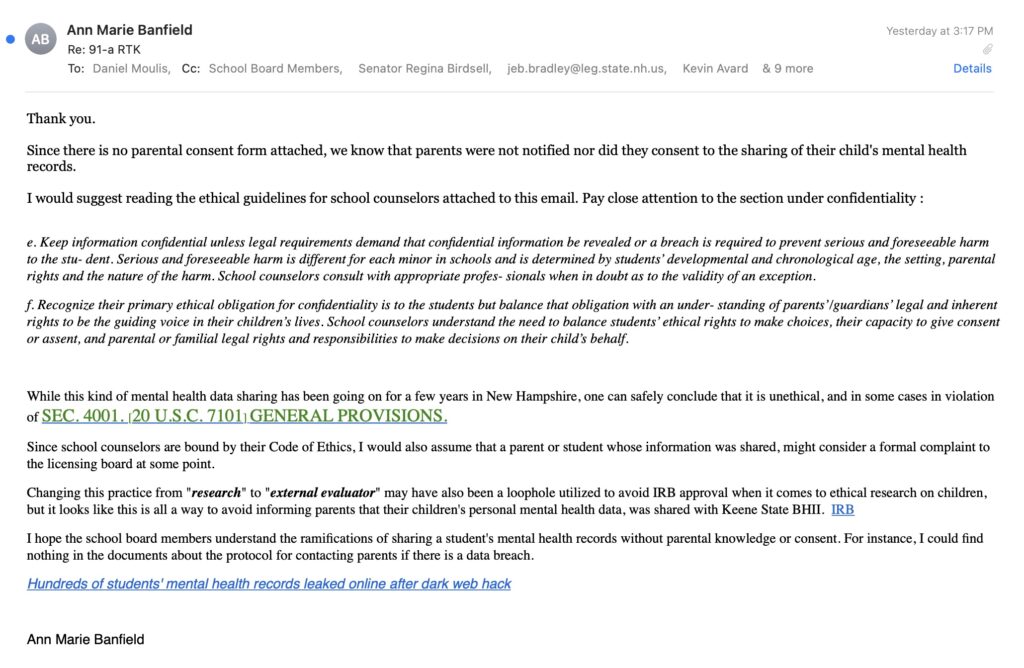Several years ago a physician from New Hampshire wrote an article in the Wall Street Journal calling attention to the psychological profiles that are now built on children in New Hampshire schools.
Most parents have no idea this is happening in their local public school.
Year after year, mental health data is collected on children, and shared with 3rd party vendors through the Social and Emotional (SEL) software programs. In addition, some of your child’s mental health information maybe shared with New Hampshire universities.
In the WSJ article, Dr. Cerundolo describes how the medical field is governed by the Health Insurance Portability and Accountability Act (HIPAA). Schools are governed by FERPA:
“under the Family Educational Rights and Privacy Act. FERPA can be more lenient than HIPAA, with allowances made for schools to disclose records without consent for such vague reasons as “legitimate educational interest” or “for audit or evaluation purposes.” HIPAA is more stringent and applies to “covered entities” such as hospitals and insurance companies, which are involved in the delivery and billing of health-care services.”
The weakening to the FERPA law occurred during the Obama administration. This has left student privacy activists alarmed at the massive amount of data that is now being collected and shared on children.
But in 2008 and again in 2011, FERPA was radically revised by the US Department of Education – without any vote or authorization from Congress.
In 2008, the regulations were rewritten to allow states, districts and/or schools to share PII data from student records without parental notice or consent with any third party or company designated as a “school official,” including “contractors, consultants, volunteers, and other parties to whom an educational agency or institution has outsourced institutional services or functions it would otherwise use employees to perform.”
Federal dollars poured into states in an effort to start assessing and treating the mental health of children in our schools. The Feds need some kind of data to justify the federal spending. How can they gather personal mental health information on children? Many parents would object. However, if they change the federal law governing student privacy, they can exclude notifying parents, and stop requiring their consent. That’s what happened.
Now that the law has been changed, there is one other requirement before conducting research on children. Researchers must seek approval from the Institutional Review Boards. (IRBs). Federal law and the American Psychological Association APA standards require IRB review of all human participant research projects. So how are the universities in New Hampshire gathering all of this mental health data on students without IRB approval? It’s a scheme that is legal, but many would argue unethical.
Call this an external audit instead of a research project, and you get to avoid IRB approval. The universities and school administrators are doing backflips in order to not tell parents what is going on with their children’s mental health data.
Keene State Behavior Health Improvement Institute was awarded the contract from the Department of Education in New Hampshire to gather the mental health data from various schools without parental knowledge or consent. See more about that here. Before Keene State it was Antioch and before that it was Plymouth State. The universities have been collecting this sensitive data for several years without parents knowing that their child’s PII has been shared. In some of these cases, federal law may have been violated leaving some of these schools at risk of a lawsuit.
Currently the PII data is gathered by school counselors and social workers, and sent on to Keene State BHII. This puts school counselors at risk of a parent filing a complaint with their licensing board since school counselors are required to follow a code of ethics when it comes to sharing this sensitive information on children.
Do you get the feeling that this is one big scheme to avoid telling parents that their children’s personal mental health information is now up for grabs? Some of this may be legal, but it’s certainly unethical. How do school administrators respond? I continue to see them year after year hand over the mental health PII without parental knowledge or consent. In other words, they don’t seem to care about the exploitation of children.
You can see my reply to one Superintendent that I contacted to see if they received informed consent by parents before sharing PII. I contacted Superintendents in Governor Wentworth, Hudson, Merrimack Valley, Raymond, Sanborn Regional, SAU 34, and White Mountains. All confirmed that they did not require informed consent before sharing the mental health data on their students. Here was my response to them:

As you can see, school administrators have put school counselors at risk of losing their certification. I would advise parents who find out that their child’s personal mental health information has been shared, file a complaint with The New Hampshire Department of Education. It’s too bad that the fall guy in this situation will be the school counselor, but parents have no other options.
Keene State BHII staff include mental health professionals that know that all of this is unethical. But when I speak to them, they point their finger at the school districts. They say that it’s their responsibility to get informed consent by parents. No one seems to want to protect these children. They are willing to exploit children in order to receive PII and funding. Keene State BII was hired to fulfill the requirements of the mental health grant. Keep the money flowing at the expense of personal privacy and parental rights.
The people who have worked in the field of psychology know why these ethical practices and boundaries were put in place. They know the history of exploiting human subjects for research. They know that they have an obligation to uphold these practices, but they don’t do it.
How do you trust what is happening in your school? How do you trust mental health professionals working in your school? How do you trust administrators who tell school counselors to ignore their Code of Ethics and share the data? How do you trust any of these people with your children?
Up next? School Based Medical Clinics. They are already in the Manchester Schools. That’s what’s coming next. Be warned.
